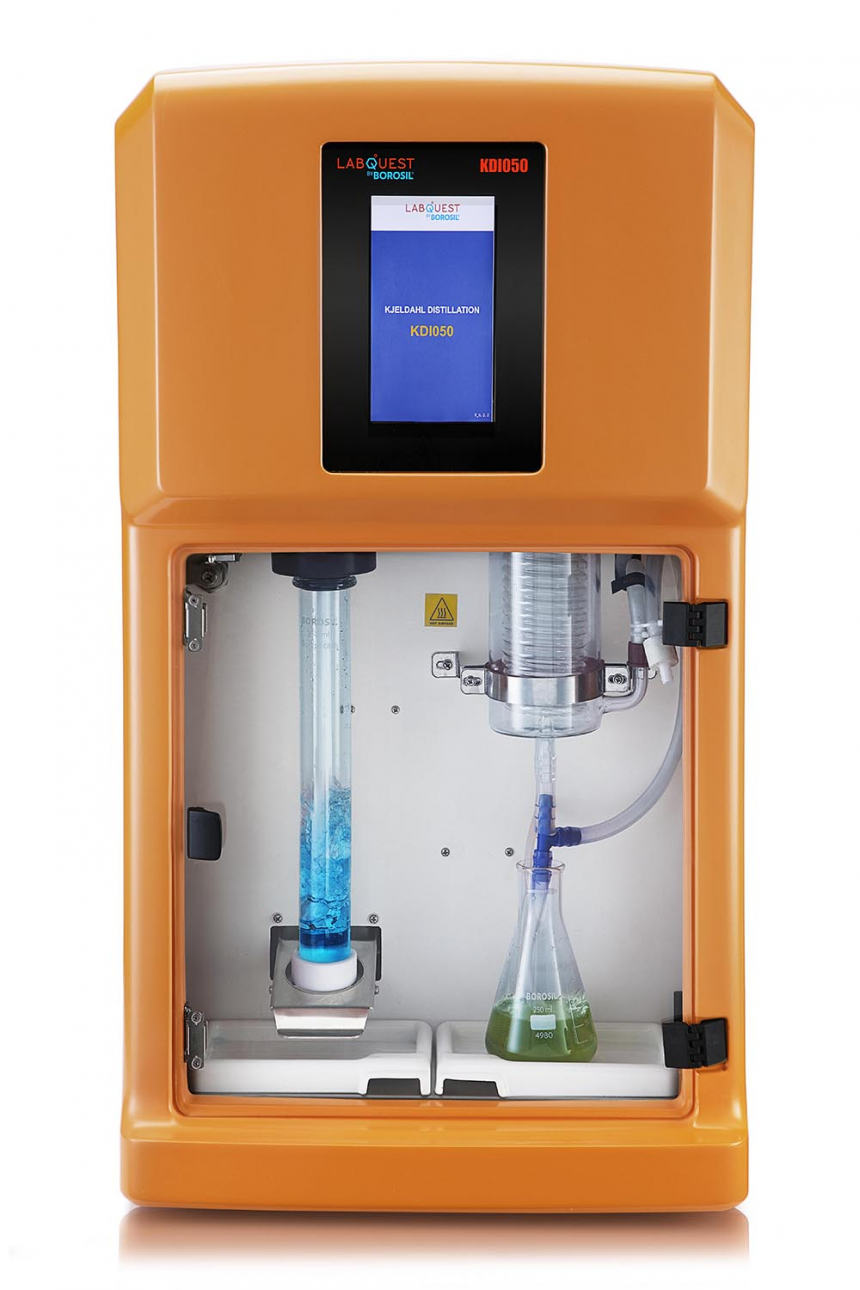In an era where precision, quality, and compliance are non-negotiable, the accurate measurement of protein content is vital across several sectors, especially the food, beverage, and feed industries. Protein analysers play a central role in ensuring product consistency, nutritional accuracy, and adherence to global regulatory standards.
- Understanding Protein Analysis
- Industry Applications of Protein Analysis
- Protein Testing Across Food, Feed, and Beverage Industries
- Kjeldahl Magnus Distillation Unit: Reliable Nitrogen Analysis for Protein Determination
- Key Features of Kjeldahl Magnus Distillation Unit
- Advantages of Kjeldahl Magnus Digestion:
- Fume Scrubber: Ensuring a Safe Analytical Environment
- Selecting the Right Protein Analyser for Your Industry
Protein quality remains a cornerstone of nutritional assessment in the food, beverage, and animal feed industries. It directly influences product integrity, regulatory compliance, and consumer trust by defining both the functional and nutritional attributes of a product. Ensuring accurate protein quantification is essential across diverse product categories, including milk, meat, cereals, oilseeds, and functional beverages, where consistency and labeling accuracy are paramount.
While various analytical techniques are employed for protein estimation, Kjeldahl nitrogen analysis continues to be recognized as the global reference standard. Celebrated for its precision, reliability, and reproducibility, the Kjeldahl method remains indispensable for manufacturers and laboratories committed to delivering high-quality, compliant, and nutritionally accurate products.
Understanding Protein Analysis
Protein is not only a fundamental nutrient but also a key indicator of product quality, nutritional value, and compliance with national and international standards. Accurate protein analysis ensures batch consistency, nutritional accuracy, and the Kjeldahl method remains the industry gold standard trusted for its precision and global acceptance.
Industry Applications of Protein Analysis
In the food industry, protein testing is essential for products like meat, dairy, cereals, and processed foods. It helps detect adulteration, verify protein content, and maintain batch-to-batch consistency. Regulatory bodies increasingly require validated protein values for transparency and safety.
The beverage industry relies on protein analysis for nutritional and functional drinks, including plant-based alternatives and protein supplements. Accurate protein data supports formulation, innovation, and brand trust by ensuring declared values are consistently met.
In the feed industry, protein analysis is crucial for formulating balanced diets for livestock, poultry, and aquaculture. It enables manufacturers to optimise the use of high-value protein ingredients, improve feed efficiency, and ensure animal health and growth.
Across all these sectors, reliable protein testing, particularly using proven methods like the Kjeldahl technique, supports quality control, product development, and competitive positioning in both domestic and international markets.
Protein Testing Across Food, Feed, and Beverage Industries
| Industry | Application | Protein Importance | Typical Protein Range (%) |
| Food Industry | Meat, dairy, cereals, processed foods | Ensures label accuracy, detects adulteration, maintains product quality | Varies widely depending on the product |
| Feed Industry | Poultry, cattle, swine feed | Optimises animal growth, reproduction, and production efficiency | Poultry: 18–22% Cattle: 12–16% Swine: 14–20% |
| Beverage Industry | Nutritional beverages, protein supplements, plant-based drinks | Validates nutritional claims, supports innovation | Typically 1–5% (varies by product type) |
Kjeldahl Magnus Distillation Unit: Reliable Nitrogen Analysis for Protein Determination
The Kjeldahl Magnus Distillation Unit is a high-performance system designed for precise nitrogen estimation, ensuring dependable protein analysis across food, feed, and agricultural samples.
Key Features of Kjeldahl Magnus Distillation Unit
Fully Automated Operation: Automated reagent addition, distillation, and residue aspiration for seamless, hands-free analysis.
High-Speed Distillation: Faster distillation without compromising accuracy—ideal for time-sensitive environments.
7-inch Touchscreen Interface: User-friendly panel with programmable methods and real-time status display.
Built-in Safety Mechanisms: Includes fume neutralisation, safety interlocks, and chemical level sensors for enhanced user protection.
Robust FRP Construction: Corrosion-resistant body and high-quality components ensure long-term durability.
Any time Alkali Addition: Allows alkali to be added at any stage of analysis, improving process control.
High Accuracy & Repeatability: Consistent results compliant with AOAC, ISO, and industry standards.
Superior Operator Safety: Minimises manual reagent handling and exposure to hazardous chemicals.
Efficient Throughput: Supports high-volume labs with quick turnaround and minimal downtime.
Broad Application Range: Compatible with a variety of sample types: food, feed, fertiliser, and environmental matrices.
High-Temperature Uniform Heating: Microprocessor-controlled block heating ensures consistent and accurate digestion.
Auto-Lift System (in Auto Models): Automatic lifting and lowering of sample tubes improve operator safety and efficiency.
Position Models Available: Suitable for high-throughput labs and flexible sample batch sizes (6,8,12,20)
Corrosion-Resistant Construction: Durable FRP body and acid-resistant coating ensure long instrument life.
Energy-Efficient Block Heating: Reduces power consumption and ensures rapid heating with thermal stability.
Over-Temperature Protection: Built-in safety cut-off to prevent overheating and equipment damage.
Standard and Custom Digestion Programs: Up to 50 custom programs can be saved and reused.
Advantages of Kjeldahl Magnus Digestion:
- Improved Throughput: Process up to 20 samples at once, saving time in high-volume labs.
- Precise and Reproducible Results: Accurate heating control ensures consistent digestion, crucial for Kjeldahl nitrogen analysis.
- Safe to Operate: Automated features and safety mechanisms reduce manual handling of hot acids.
- Easy Maintenance: Modular design allows quick access to the heating block and control system for servicing.
- Eco-Friendly Operation: Fume scrubber ensures minimal emission of acid vapours into the environment.
Fume Scrubber: Ensuring a Safe Analytical Environment
Advanced Four-Stage Scrubbing System: Efficiently neutralises hazardous acidic and organic fumes through a sequential four-stage process, ensuring maximum operator safety, lab protection, and environmental compliance.
- Stage 1: Condenser Water Trap
- Stage 2: Distilled Water Stage
- Stage 3: Alkali Stage
- Stage 4: Activated Carbon Filter
High-Efficiency oil free suction pump: Ensures uniform fume extraction across all digestion tubes, improving reaction efficiency.
Low Noise Operation: Engineered for silent operation, maintaining a lab-friendly environment.
Selecting the Right Protein Analyser for Your Industry
| Instrument | Best For |
| Kjeldahl Magnus Distillation Unit | High-accuracy nitrogen analysis in dairy, meat, and feed industries |
| Kjeldahl Magnus Digesters | Efficient sample digestion for large-scale food testing |
| Fume Scrubber | Neutralises hazardous digestion vapours, ensuring lab safety |
By selecting the appropriate protein analyser, you can optimise production quality, meet regulatory requirements, and enhance nutritional value.
Conclusion
Protein analysis plays a critical role in food safety, quality assurance, and regulatory compliance across various sectors. With high-precision Kjeldahl digestion and distillation systems, industries such as dairy, meat, animal feed, and beverages can ensure accurate protein measurement, safeguarding product integrity and reinforcing consumer trust.
From meat processing plants to infant formula laboratories, Kjeldahl nitrogen analysis remains the gold standard for determining protein content. Its proven methodology delivers reliable, repeatable, and scientifically robust results, making it indispensable for both research and industrial quality control applications.








